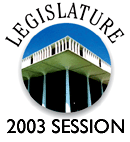
Reality hits bills hard
in House and Senate
When it comes to crafting legislation, some ideas, like the sweeping education reforms proposed by Gov. Linda Lingle, die very public deaths.
Other proposals, like a bill to ban wireless spam, barely make a whimper.
And many, like a measure to provide a tax credit for businesses that create good-paying jobs, make it part of the way through the process only to die quietly.
"Legislation normally takes more than one year to pass, especially when it's a brand-new idea," said Rep. Brian Schatz (D, Tantalus-Makiki).
Legislature Directory
Legislature Bills & Hawaii Revised Statutes
Schatz was among Democratic House leaders who touted the job creation measure in January as one of the key pieces of legislation introduced this session by the chamber's majority caucus.
The bill passed through the House and through two Senate committees but ultimately was tabled upon referral to the Senate Ways and Means Committee.
Like all bills introduced this year, the measure has a two-year shelf life and still can be revived next year, leaving lawmakers that much time to lobby whomever they need to in order to gain support in 2004.
"It's an idea that we continue to think is worthy," Schatz said. "We think when you stack a job creation tax credit up against some of the other credits that are being considered, that the job creation tax credit is still a worthy idea."
In all there were 1,691 House bills and 1,710 Senate bills introduced this session. Only a few hundred of them have made it to the floors of both chambers for final approval this week.
While bills such as the job creation tax credit die quietly, others go out with much fanfare.
Lingle's education reform package -- which included a vote on locally elected school boards, removing principals from unions and increasing the number of charter schools -- was shelved by House lawmakers early in the session.
But Lingle spent the rest of the session lobbying the public to get behind her plan to let voters decide on local school boards, even going so far as to say that those who continue to oppose the idea might face political consequences in 2004.
Senate lawmakers kept alive a bill that could have been used to reintroduce her plan, only to drop the idea after House leadership remained firm in its position to study the idea during the interim and come back next year to craft a ballot question for 2004.
Then there are those bills that never make it past an initial hearing.
The proposal to prohibit sending wireless spam -- unsolicited telemarketing calls, text, graphic or picture messages -- to mobile devices was introduced by Rep. Roy Takumi (D, Pearl City-Pacific Palisades).
Even he admitted he was unsure if the bill was needed.
"We won't really know until we have a public hearing on it and people can come in and state their own opinion on it," Takumi said in January.
The measure was heard by the House Committee on Consumer Protection and Commerce and deferred indefinitely.
